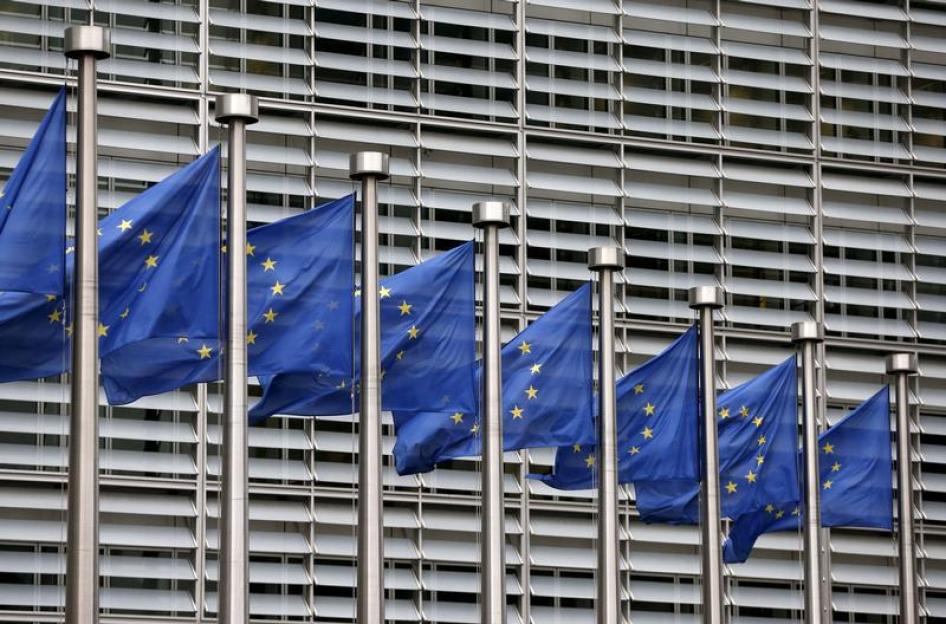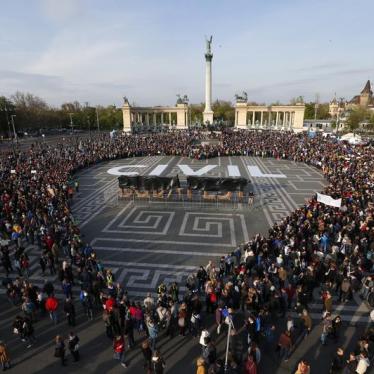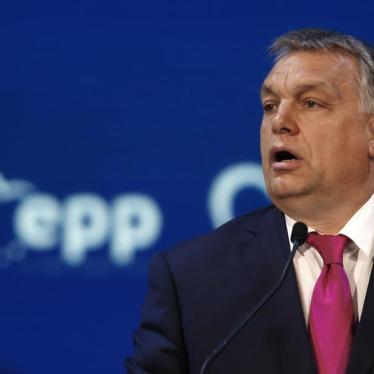The Tuesday (22 June) European Council meeting on Hungary and Poland is a chance for the EU to show that it is finally taking EU values seriously.
For too long, Ursula von der Leyen's European Commission has offered few signs of prioritising the fight for the rule of law, doing nothing to revive scrutiny under Article 7, the EU treaty mechanism to deal with states putting EU's democratic ideals at risk.
The council meeting will now be the first time the EU has looked at Article 7 since September 2018 on Poland and since December 2019 on Hungary.
True, the commission has continued to use legal infringements against member states in breach of the rule of law – but often too late and too slowly, and it failed to react quickly when states ignored key EU Court rulings.
The commission's new rule-of-law report includes detailed analysis for each member state but doesn't lead to any consequence for states failing to meet their obligations.
The flawed deal between the EU heads of states and von der Leyen's commission on rule of law conditionality for EU funding watered down the provisions and delayed their introduction, leading frustrated European Parliamentarians to take the commission to court to speed things up.
Brussels dithering
While Brussels dithered, the situation in both countries under scrutiny has continued to worsen.
Poland's judges face unfair disciplinary proceedings, a serious interference with their independence. The government transformed the Constitutional Tribunal into a court at its service and used it to bypass parliament.
The government has used this co-opted tribunal to discontinue the ombudsman's mandate and to virtually ban access to legal abortion, putting the lives and dignity of millions of women at risk.
In Hungary, the government used the Covid-19 pandemic as a pretext to increase executive powers.
More independent media were dismantled or taken off the airwaves.
The government has yet fully to repeal a law targeting access to foreign funding for civil society groups over a year after the EU Court of Justice ruled that it violated EU law, while a controversial 2018 law criminalising groups giving assistance to asylum seekers remains in place.
In both countries, LGBTI people have become targets for harassment, smear campaigns and restrictive laws. A law Hungary adopted in mid-June bans discussions on sexual orientation and gender identity, offensively and dangerously equating paedophilia with sexual and gender diversity.
Given this reality and the time lost, the EU has much catching up to do to show they are taking the rights of EU citizens seriously.
EU member states should make the next week's General Affairs Council hearings an occasion to seriously revive the Article 7 proceedings. The hearings on Poland and Hungary are a good start.
EU ministers should commit to regularly scrutinise the situations and hold both governments to account, and urgently move toward adopting rule-of-law recommendations and voting to determine that there is a "clear risk of serious breach" of EU values in both countries.
The European Commission should also use its authority to trigger legal infringements that are faster and more strategic to ensure that the EU court can block the rule of law breakdown in EU states.
In addition, the Commission should urgently boost its support for Article 7 by, for example, updating and expanding its own December 2017 opinion that triggered proceedings on Poland, and join the September 2018 action of the European Parliament on Hungary.
EU member states and the EU Commission still have to prove they are ready to stand up for the rights of every citizen in the EU. For all its practical challenges, the Article 7 mechanism should remain the cornerstone of their action. Throwing the towel in would send a terrible signal to European leaders tempted to emulate Hungary and Poland and above all to the people of those countries, who would rightly feel abandoned by the EU in their time of need.
All EU institutions and Member States should also speak up loud and clear to say that Hungary and Poland's hollowing out of democracy cannot stand in the EU. They should openly acknowledge that without a dedicated defense of the EU's core values, the authoritarian rot in Europe will only spread further.
The 22 June hearings on Poland and Hungary should mark a true start of democratic Europe's fight back, a way to show that EU membership and rule-of-law are inseparable. This should not be just another Council meeting; it should be the beginning of a long and concentrated effort for a true democratic recovery.
The Tuesday (22 June) European Council meeting on Hungary and Poland is a chance for the EU to show that it is finally taking EU values seriously.
For too long, Ursula von der Leyen's European Commission has offered few signs of prioritising the fight for the rule of law, doing nothing to revive scrutiny under Article 7, the EU treaty mechanism to deal with states putting EU's democratic ideals at risk.
The council meeting will now be the first time the EU has looked at Article 7 since September 2018 on Poland and since December 2019 on Hungary.
True, the commission has continued to use legal infringements against member states in breach of the rule of law – but often too late and too slowly, and it failed to react quickly when states ignored key EU Court rulings.
The commission's new rule-of-law report includes detailed analysis for each member state but doesn't lead to any consequence for states failing to meet their obligations.
The flawed deal between the EU heads of states and von der Leyen's commission on rule of law conditionality for EU funding watered down the provisions and delayed their introduction, leading frustrated European Parliamentarians to take the commission to court to speed things up.
Brussels dithering
While Brussels dithered, the situation in both countries under scrutiny has continued to worsen.
Poland's judges face unfair disciplinary proceedings, a serious interference with their independence. The government transformed the Constitutional Tribunal into a court at its service and used it to bypass parliament.
The government has used this co-opted tribunal to discontinue the ombudsman's mandate and to virtually ban access to legal abortion, putting the lives and dignity of millions of women at risk.
In Hungary, the government used the Covid-19 pandemic as a pretext to increase executive powers.
More independent media were dismantled or taken off the airwaves.
The government has yet fully to repeal a law targeting access to foreign funding for civil society groups over a year after the EU Court of Justice ruled that it violated EU law, while a controversial 2018 law criminalising groups giving assistance to asylum seekers remains in place.
In both countries, LGBTI people have become targets for harassment, smear campaigns and restrictive laws. A law Hungary adopted in mid-June bans discussions on sexual orientation and gender identity, offensively and dangerously equating paedophilia with sexual and gender diversity.
Given this reality and the time lost, the EU has much catching up to do to show they are taking the rights of EU citizens seriously.
EU member states should make the next week's General Affairs Council hearings an occasion to seriously revive the Article 7 proceedings. The hearings on Poland and Hungary are a good start.
EU ministers should commit to regularly scrutinise the situations and hold both governments to account, and urgently move toward adopting rule-of-law recommendations and voting to determine that there is a "clear risk of serious breach" of EU values in both countries.
The European Commission should also use its authority to trigger legal infringements that are faster and more strategic to ensure that the EU court can block the rule of law breakdown in EU states.
In addition, the Commission should urgently boost its support for Article 7 by, for example, updating and expanding its own December 2017 opinion that triggered proceedings on Poland, and join the September 2018 action of the European Parliament on Hungary.
EU member states and the EU Commission still have to prove they are ready to stand up for the rights of every citizen in the EU. For all its practical challenges, the Article 7 mechanism should remain the cornerstone of their action. Throwing the towel in would send a terrible signal to European leaders tempted to emulate Hungary and Poland and above all to the people of those countries, who would rightly feel abandoned by the EU in their time of need.
All EU institutions and Member States should also speak up loud and clear to say that Hungary and Poland's hollowing out of democracy cannot stand in the EU. They should openly acknowledge that without a dedicated defense of the EU's core values, the authoritarian rot in Europe will only spread further.
The 22 June hearings on Poland and Hungary should mark a true start of democratic Europe's fight back, a way to show that EU membership and rule-of-law are inseparable. This should not be just another Council meeting; it should be the beginning of a long and concentrated effort for a true democratic recovery.










